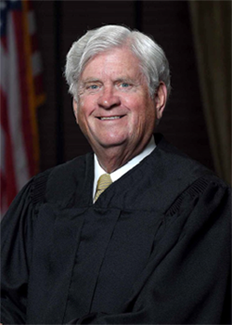
Administrative Office of Courts
|
Chief Justice Randolph to speak to Starkville Rotary Club Feb. 7 February 1, 2022 Supreme Court Chief Justice Mike Randolph will speak to the Starkville Rotary Club on Feb. 7 at noon. The Rotary Club will meet at noon at the Hilton Garden Inn in Starkville. 
Chief Justice Randolph is expected to talk about the role of drug intervention courts. The state currently has 42 drug intervention courts. There are 22 adult felony drug intervention court programs – one in each of the 22 Circuit Court districts. There are also three adult misdemeanor drug court programs, 13 juvenile drug courts and three family drug courts. The 16th Circuit Intervention Court has 76 active participants. During the 2021 fiscal year, the 16th Circuit program collected $20,356 in fines, court costs and restitution and $66,800 in fees. Intervention court participants pay a monthly participation fee. The 16th Circuit includes Oktibbeha, Clay, Lowndes and Noxubee counties. During the past 10 fiscal years, FY 2012 through FY 2021, intervention courts statewide have graduated more than 6,990 participants. The savings to Mississippi taxpayers from those participants working and being productive citizens while remaining out of prison is more than $586 million. That’s an estimate of the incarceration costs had they been in prison. Another measure of the success of the intervention courts is that 590 drug-free babies were born to program participants statewide during the past 10 years. The value of a healthy life is immeasurable. Drug intervention courts have saved the State of Mississippi more than $442 million for the 590 drug-free babies born to participants since FY12. According to a study conducted by the Bureau of Justice Statistics, each healthy, drug-free infant saves the state an average of $750,000 during the first 18 years of life. Other accomplishments of those 6,990 intervention court participants include:
Between 2006 and 2018, Mississippi’s adult felony drug intervention courts had a recidivism rate of 3.5 percent, compared to the Department of Corrections’ recidivism rate of 35.9 percent for FY 2012. Chief Justice Randolph is the leader of the Mississippi judicial branch of government. He became Chief Justice of the Supreme Court on Feb. 1, 2019. He is the longest currently serving member of the Supreme Court, with more than 17 years of service. He was decorated for heroism in Vietnam, where he served with the U.S. Army 1st Infantry Division, the Big Red One, before he was honorably discharged. During law school, he received an appointment as a Reserve officer in the United States Navy Judge Advocate General Corps. He is a graduate of the Naval Justice School in Newport, Rhode Island. He graduated from Rollins College in Winter Park, Fla., with a B.S. degree in business administration. He earned his Juris Doctor from the University of Mississippi School of Law, where he served as president of the Law School Student Body. He began practicing law in 1975 in Biloxi with the firm of Ross, King and Randolph. He then practiced with the firm of Bryan, Nelson, Allen and Schroeder on the Mississippi Gulf Coast. He opened a Hattiesburg office for Bryan, Nelson, Allen and Schroeder in 1976. He later formed the firm of Bryan Nelson Randolph, PA., serving as President and CEO until his appointment to the Supreme Court in April 2004. He has homes in Hattiesburg and Ocean Springs. #### |